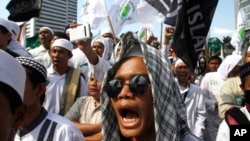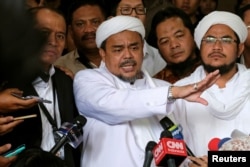After playing a major role in Indonesian politics by influencing the Jakarta election, hard-line Islamist groups may have hit an impasse.
Although they were allowed broad leverage to organize and demonstrate across Indonesia in the past year, an effort to replicate their success outside Jakarta fell flat, and the government has taken measures to hamper two major hard-line groups.
And a new survey suggests most Indonesians don’t know about some major Islamist groups, much less support them, both domestic ones and global organizations like the so-called Islamic State (IS).
Federal crackdown
Indonesia’s government has taken a pointed stand against the Islamic Defenders’ Front (FPI), the hard-line group that organized last year’s anti-Ahok rallies and acts as Indonesia’s unofficial moral police by helping activities like recent anti-gay raids.
Jakarta police issued a warrant for the arrest of FPI leader Habib Rizieq Shihab, who is in Saudi Arabia, on a pornography charge linked to his sexting scandal with a female social activist.
Beyond FPI, Indonesian Security Minister Wiranto also announced that the state would ban the radical Islamist group Hizbut Tahrir Indonesia (HTI) because its goals run counter to the pluralistic state ideology known as Pancasila. After Wiranto’s announcement, Indonesia President Joko "Jokowi" Widodo repeated a promise to “clobber” radical groups that threaten Pancasila.
“The crackdown on Rizieq Shihab and Hizbut Tahrir … looks to me like a response from the government to the anti-Ahok mobilization,” said William Liddle, an Indonesian politics scholar at Ohio State University. Ahok was the Chinese Christian Jakarta governor who was the target of Islamist protests late last year, which played a role in his resounding defeat in his re-election bid last month.
The next Jakarta governor, Anies Baswedan, openly allied with FPI in his campaign, which seemed to give the group a newfound legitimacy. But FPI’s mandate may be narrowing. When FPI tried to organize a similar demonstration against the Christian governor of West Kalimantan, Cornelis, who vowed to ban extremists from his province, the result was anticlimactic, with just a few thousand people in attendance.
One reason is that FPI was up against a more formidable enemy than Chinese Indonesians, a long downtrodden minority; Cornelis is an indigenous Dayak person, a group with a history of using lethal violence in sectarian conflict.
So hard-line groups such as FPI are by no means all-powerful, or even broadly effective outside the specific Jakarta election context.
“The cynical support of secular elites was key to mobilizing opposition to Ahok. Without that support, FPI struggled,” said Aaron Connelly, a research fellow at the Lowy Institute.
Indonesian attitudes on Islamist groups
A recent poll on extremist groups from the Jakarta-based Saiful Mujani Research and Consulting found that more than 66 percent of the 1,350 adults polled nationwide had heard of IS. Of the 66.4 percent who had heard of IS, 90 percent viewed IS as a threat to the country and even more, 92.9 percent, favored banning the group in Indonesia, according to the May 14-20 survey.
Two years ago, a Pew Research Center poll found 79 percent of Indonesians had unfavorable opinions of IS, and only 4 percent favored the group. That survey was conducted in 11 countries with significant Muslim populations, including several in the Middle East and Africa.
The new survey, however, showed that 10 percent of those who had heard of IS do not see IS as a threat to Indonesia, and many have never heard of the group.
So aside from hard-line groups, it remains to be seen exactly where Indonesians, who are 87 percent Muslim, stand on Islamist politics and Muslim leadership.
Last year, researchers Elizabeth Pisani and Michael Buehler analyzed the roughly 440 sharia-inspired bylaws across Indonesia, and found that Islamic legislation did not translate into re-election votes for the politicians that advocated them.
Extremism threat still small
Beyond perceptions of extremism, the threat of actual violent extremism in Indonesia remains low. There was a suicide bombing in an East Jakarta train station last month that killed three police officers, but it was perhaps most notable for the fact that it caused fatalities.
The current generation of Indonesian terrorists are neither many nor effective: three recent suicide attacks resulted in only the death of the bomber, according to a 2016 report from the Economist Intelligence Unit. Indonesia also has a famously capable counterterrorism program, particularly the elite Detachment 88 squad formed after the 2002 Bali bombings.
Indonesian militants today largely “lack the capacity” to inflict much damage, said Nava Nuraniyah, of the Institute for Policy Analysis and Conflict. “Unlike the [Al Qaeda affiliated] Jemaah Islamiyah generation, they were never trained abroad … learning bomb making from the internet could only take them so far.”
Reporting for this story was made possible with a grant from the Pulitzer Center for Crisis Reporting.





